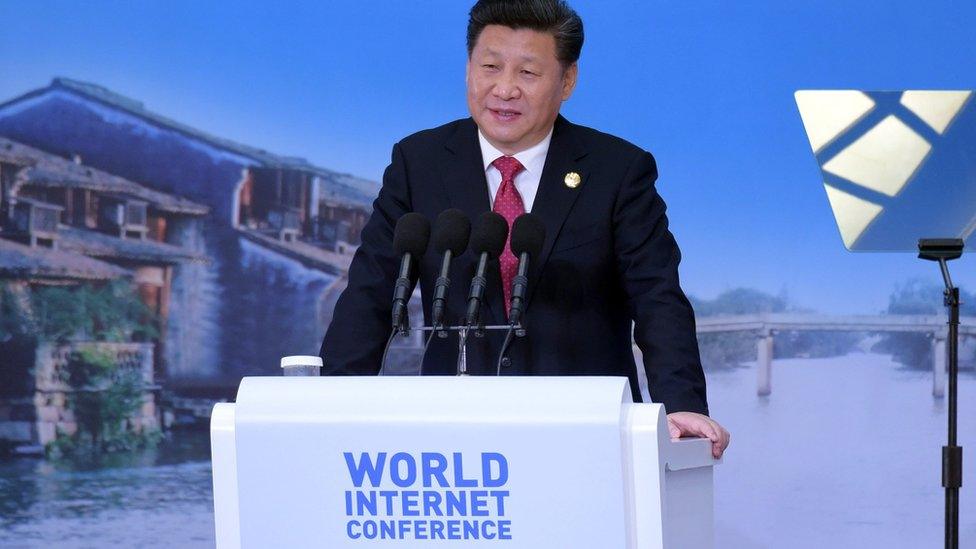Why politicians still dream of controlling the internet
- Published
- comments

Who's in charge of the internet? In the last 24 hours two political figures, one Chinese, the other American, have given their views on this issue.
Both Xi Jinping and Donald Trump clearly thinks it is time for national governments to grasp control of the internet to bend it to their own political purposes.
China's leader was speaking in Wuzhen at an event called the World Internet Conference, which sounds grand and did bring in delegates from leading technology companies including Apple and Microsoft, plus the Internet naming body ICANN. But the only world leaders in attendance were from Russia, Pakistan, Kazakhstan, Kyrgyzstan and Tajikistan, countries presumably sympathetic to China's view of how the internet should be governed.
"Cyberspace is similar to the real world in that both freedom and order are necessary," President Xi declared in his opening keynote speech. But it seems that "order" is the priority in China, where the increasingly sophisticated Great Firewall acts as a strict border control for the internet, making sure it conforms with the Communist Party's view of the world.
Mr Xi did make this call for global co-operation: "Each country should join hands and together curb the abuse of information technology, oppose network surveillance and hacking, and fight against a cyberspace arms race." But he also called for "cyber sovereignty" with each country respecting the right of others to manage the internet according to their own priorities.
The United States, which has accused China of being a leading offender when it comes to hacking and the "cyberspace arms race" will look at the Chinese president's speech with a sceptical eye.
But some American politicians may share his view that it is time to rein in the internet.
Take Donald Trump. At last night's Republican debate, he declared that technology was the way to take on the terrorist threat: "We should be able to penetrate the internet and find out exactly where Isis is." The internet was "our idea" but the US needed to "close off areas of the internet" because Isis was using it better. "We can do that if we use our good people."
Donald Trump at Monday's Republican debate
Mr Trump's somewhat sketchy ideas about how the internet works came in for plenty of ribbing on social media. But his view that this online wild west needs to be tamed is one that is increasingly common among US politicians and security chiefs. After all, Hillary Clinton, who could end up in a battle for the White House with Mr Trump, has called on the technology firms - those "good people" - to disrupt the terrorists.
The idealistic internet pioneers - most of them American - saw it as a global community without borders, a space for free exchange of ideas untrammelled by national laws. But whether it is China determined to shore up its Great Firewall, the US wanting to curb communications between terror groups, or indeed Europe debating at what age children should be allowed online, local politicians are asserting their right to bend the internet to their will.